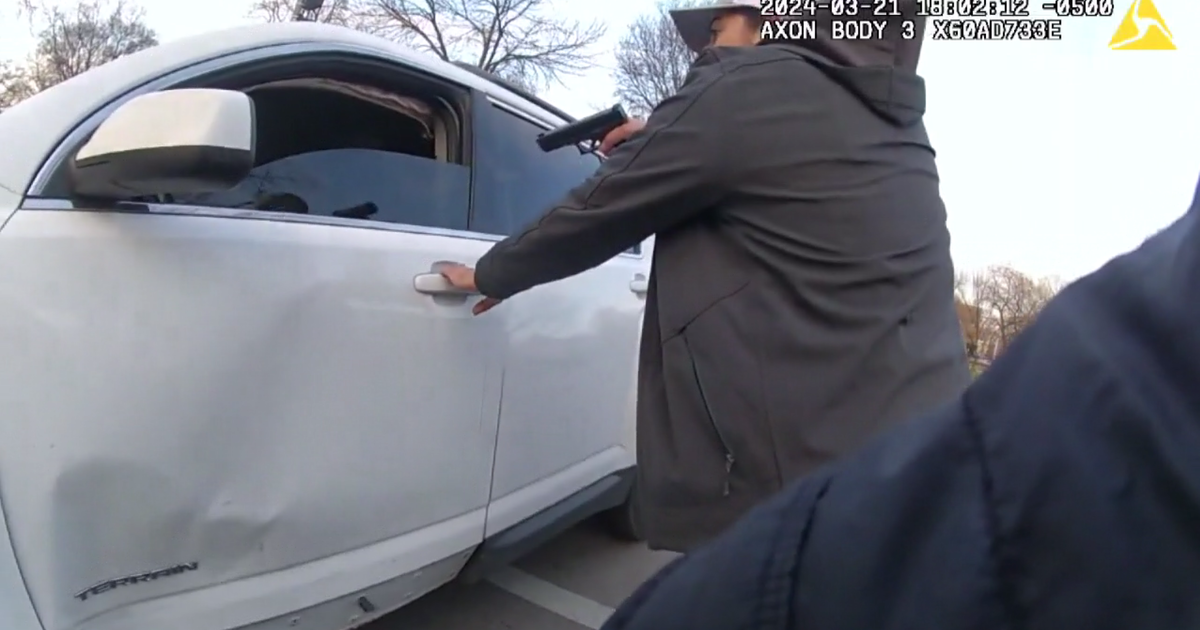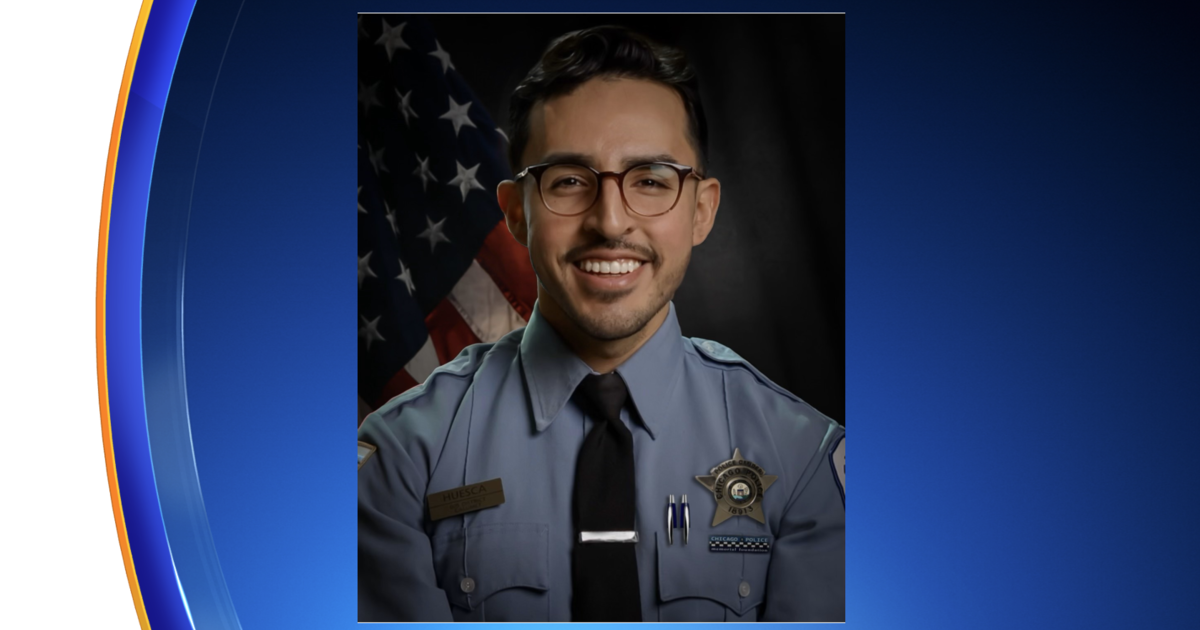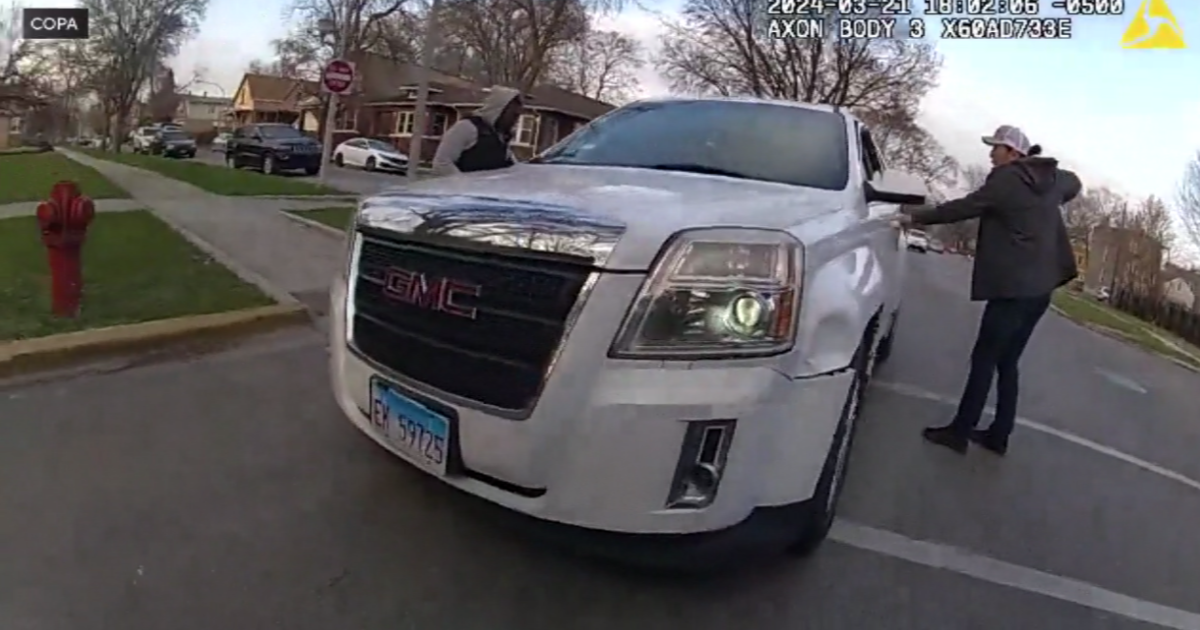911 Dispatcher Keith Thornton Jr., On Duty When Officer Ella French Was Killed, Shares The Many Lessons He's Learned And The Powerful Connections He's Made
CHICAGO (CBS) -- Keith Thornton Jr. was the calm voice in the chaos of a tragedy one month ago Tuesday night, when two Chicago Police officers were shot in the line of duty.
Thornton, a 911 dispatcher with the Chicago Office of Emergency Management and Communications, was applauded for his decisive action over the radio that night. He told CBS 2 Investigator Megan Hickey in his first TV interview that it was the officer he couldn't save who changed his goals for the future.
Thornton signed on for his third-watch shift at 4 p.m. Saturday, Aug. 7. Hours later, horror and chaos erupted.
"We were like, man, it's time to go out and eat after work, just relax, you know? That didn't happen," he said. "I heard someone out there running."
This is what went out over the OEMC dispatch channels later that evening:
Officer: "Officer down!"
Thornton: "I got an officer down! 10-1! 10-1! Six-three and Bell! Officer down! Officer down! Shots fired at the police! Officer down!"
Two officers had been shot at 63rd Street and Bell Avenue in West Englewood during a traffic stop. One of them, Officer Ella French, did not survive.
Afterward, Thornton did everything he could to manage the situation remotely.
"Guys, I got my job. Do yours. Take care of my officers out there. Got two ambulances rolling," he said over the dispatch system.
Thornton, whose title with the OEMC is police communications operator II, described the situation as he talked to Hickey a month later.
"My heart's pumping. My eyes are dilated. I'm pacing the floor," he said. "I just had to do whatever I could from behind those screens."
And he did.
"Ok, listen to me. Take that damn vest off right now and start compressions. Start breathing. Whatever we got to do, start it now. While you're driving, the officer in the back with her take her vest off and start compressions now. You've got the air," he told the officers over the dispatch system that night.
The night of Saturday, Aug. 7, was Thornton's worst day on the job. Officer French and Officer Carlos Yanez Jr. were the reason for his 10-1's, or emergency police backup calls.
Both had been shot in the face. Only Yanez survived.
Thornton did not have a hint of hesitation as he directed the police units at the University of Chicago Medical Center where the officers were rushed, all while managing the officers at the scene of the shooting.
But when Thornton joined Hickey at the corner 63rd Street and Bell Avenue, it was his first time there.
"It's very sad here," he said. "Even with these guys in custody, it's just very sad."
And for a man who talks for a living, he said, "It's just no words. I'm a man of words, and I have no words. It's just very breathtaking - in a not-so-good way."
But Thornton is forever changed by the fallen Officer French – a woman he never had the honor to meet.
"She was great. She did wonderful things in her community," he said, "and we're going to keep that going for her."
The loss of Officer French managed to get the unflappable call-taker choked up over the radio in the wake of the shooting.
"I was crying in the middle of it. My partner was crying," Thornton said. "But we as dispatchers have a job to do, just like everyone else."
Thornton did everything he could to help Officer French – and people heard all about it. He was honored with praise everywhere from Twitter to a Chicago firehouse.
Thornton first found his voice growing up on the West Side of Chicago – the Austin community, to be exact. He talked with Hickey while walking down Chicago Avenue at Lamon Avenue – where stands a landmark that was very important to the development of who Thornton became.
"My daycare was right down the block. Once we'd get off the CTA bus, we'd walk right past this fire station - and that's what got me started," he said. "I knew as a little child that they were the guys that helped people, you know, and that's what I wanted to be a part of."
So Thornton, in his own words, wrote "letters and letters and letters" to the firehouse in his neighborhood.
"Well, we received a letter in the mail at the firehouse, and it was this very well-written letter - talking about how he loved the job that we did," said retired Chicago firefighter Lenny Sposato. "He really wanted to know about the Fire Department."
So Sposato took Thornton up on it.
"Firefighter Lenny Sposato called my parents, and he made it happen where I came over for one day - and that one day turned into just a lifetime," he said. "The rest is history."
Thornton described what he did at the firehouse starting out.
"I clean up the trucks, I sweep the rooms, I help them cook - I eventually started going to calls with them, you know, whether it be medical calls, fires," he said.
He made such an impression that 21 years later, the now-retired firefighter Sposato recognized the voice over the radio that awful night.
"When I heard the dispatch call, me and my brother were talking about it, and and I said, 'That sounds like Keith!' And it ended up being Keith, you know, just doing the job that he knew he was supposed to do," Sposato said. "I always knew that he would do what he was supposed to do."
Hickey asked Sposato if he was proud of Thornton.
"I am. I am," he said. "Very much so."
Thornton's seventh-grade teacher, Maureen Demma, recognized that voice that night too.
Demma: "Tears. I had tears."
Hickey: "You had tears listening to his dispatch call?"
Demma: "Yeah. Both because it was sad, and just, I was so proud of him for holding it all together and just doing an amazing job."
Thornton's poise wasn't happenstance. He went from volunteer firefighter and EMT to officer with the Los Angeles Police Department. He knew exactly what he was doing that night of Aug. 7 on the radio — because he'd been in those shoes before.
"I heard once that they were going to go to Holy Cross Hospital, and once again, learning from these guys for many years of experience, I know the hospitals throughout the city," he said, "I know a lot, you know, medical-wise, and I said, 'Don't go to Holy Cross.'"
As Thornton advised over dispatch radio, Holy Cross Hospital is not a trauma center. The University of Chicago Medical Center is. The officers were taken to the latter hospital.
"You're scared for your life," he said. "Everyone thinks these officers are these big bad people. We're not. They're not."
But as a dispatcher, Thornton never got a breather.
"I had to come right back the next day, talk on the air all over again, and do it again," he said, "And guess what happened - another 10-1 came out, another 10-1 - I had four 10-1's after that."
Jen McGowan-Tomke with the National Alliance on Mental Illness Chicago said emergency dispatchers are put under unusually stressful conditions.
"They answer the phone and they don't know what's going to be on the other end. They prepare other first responders to know what they're walking into," McGowan-Tomke said, "and they also have no time between calls. They move one to one to one, and so that impact is significant."
McGowan-Tomke said right now, 911 professionals are classified as an "Office and Administrative Support Occupation." That puts them in the same category with secretaries and office clerks.
Classifying them as a "protective service occupation" would mean more mental health services for dispatchers like Thornton and his colleagues at OEMC.
Now, Thornton is campaigning to see that change through. He supports the federal 9-1-1 Saves Act of 2021 — which would change that designation. The bill has been referred to committee.
"We need to start supporting the people who we don't see, but they're getting you help when you need it," Thornton said.
Thornton said he is also making it his goal to mend the strife that has led to the epidemic of violence in Chicago - in French's name.
And he's got an important backer. One that knew Ella better than anyone else – her brother, Andrew French.
"Hearing the call a whole, it made it real," Andrew French said. "You couldn't have done a better job, Keith. You really couldn't have. I'm so proud of you, my dude. I'm so proud of you, my dude. I'm so proud of you."
Andrew French continued: "He's picking up right where Ella left off, and I, I have to stand behind it. I just don't know how not to."
Thornton told Andrew French, "Just like I'm you're my brother man, you know, that's my Virgo sister - and I'm going to do everything that I have to do that family does."
A new family has been forged through a tragedy that shook Chicago.
"If I could talk to Ella right now, I would tell her: 'Don't you worry. You're not done. Continue looking over us,'" Thornton said. "'the same way we entrusted you, the same way, we need you to trust us that were going to be down here doing the right thing."
Thornton's bosses at the Office of Emergency Management and Communications said they are proud of the actions taken by 911 dispatchers and call-takers as the scene unfolded, and OEMC is planning to honor them soon for their professionalism and devotion on that night.
We'll be there.



